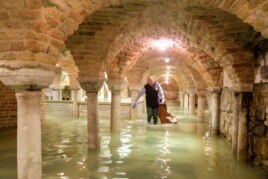13 November, 2019
Venice, Italy is experiencing its worst flooding in more than 50 years. The floods resulted in calls Wednesday to help protect the historic city from rising sea levels.
Italian officials estimate the flood waters have caused hundreds of millions of euros in damage.
The water reached 1.87 meters above sea level Tuesday. It was the second-highest level ever recorded in Venice and just 7 centimeters lower than the historic flood of 1966.
Another wave of very high water followed on Wednesday.
"Venice is on its knees,'' Mayor Luigi Brugnaro said on Twitter. He added that "St. Mark's Basilica has sustained serious damage, like the entire city and its islands."
The mayor declared a state of emergency in the city.

The flooded crypt of St Mark's Basilica is pictured during very high water levels in Venice, Italy November 13, 2019
The historic St. Mark's Basilica was flooded, while many squares and passages between buildings were left deep under water. Flood waters entered the crypt under the basilica for only the second time in its history. The water entered through windows, moving past all defenses to the burial area.
Brugnaro said on Wednesday that the combination of two wind fronts caused the second-highest tide ever recorded in Venice.
Second highest tide
"Winds from the north and south entered the harbor entrance pushing the sea into the lagoon and increasing the tide," he said. The mayor added that the sea had covered the island of Pellestrina — a landmass that defends the lagoon city.
Nearly every home on the island appeared to have flood waters reaching their front doors or entrances. One man died on Pellestrina while trying to pump water out of his house.
People visiting Venice floated suitcases through St. Mark's Square. Officials removed walkways to prevent the suitcases from floating away. Water poured through wooden boards that store and hotel owners placed in front of doors to hold back water during flooding. Travelers staying on the ground floor of hotels were forced to move to upper floors overnight.
The flood damage
Pictures on social media showed a city ferry, water taxis and gondolas — another kind of boat — grounded on walkways. At least 60 boats were damaged in the flooding, civil protection officials said.
Brugnaro said the damage would reach hundreds of millions of euros, and he called on Italy's government to declare a state of emergency.
Venice's mayor told reporters it was not just about the financial damages, "but of the very future of the city." He said people would leave the city because of the flooding.
The city is built upon a system of canals.
Brugnaro blamed climate change for the "dramatic situation." He called for quick completion of a long-delayed project called ‘Moses.' This project involves building movable undersea barriers to limit flooding. No launch date is in sight.
The worst may be yet to come. More bad weather is predicted to come over the next few days.
I'm Anne Ball.
Anne Ball wrote this story, with information from Reuters and the Associated Press. The editor was George Grow.
What do you think of this story? Write to us in the comments section below.
_______________________________________________________________
Words in This Story
square – n. an open space or central meeting place
tide – n. the regular upward and downward movement of the level of the ocean that is caused by the pull of the Sun and the Moon on the Earth
lagoon – n. an area of sea water that is separated from the ocean by a reef or sandbar
harbor – n. a part of the ocean, a lake, etc., that is next to land and that is protected and deep enough to provide safety for ships
suitcase – n. a large case that you use to carry your clothing and belongings when you are traveling
canal – n. a man-made waterway for boating or transporting water to farmland